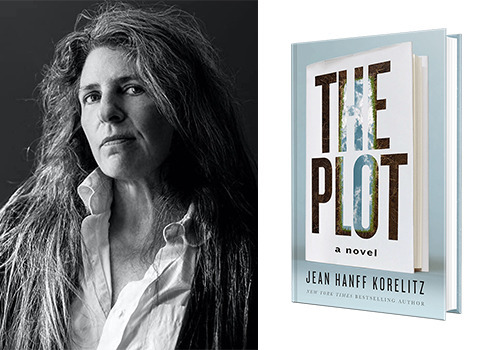Author Interview: Jean Hanff Korelitz on Plotting

Every year, we’re lucky to have great sponsors for our nonprofit events. In author and NaNoWriMo supporter Jean Hanff Korelitz’s new novel The Plot, a failing author steals an unused idea for a bestselling book with deadly results. Today, we asked Korelitz some questions about how she came up with the idea for The Plot—and her approach to plotting a novel:
Q: How did you go about plotting this novel? For example, did you outline it or refer to any popular plotting resources like Save the Cat or Hero with a Thousand Faces? Or do you trust a more improvisational approach to writing and plotting? Or both?
A: I’ve actually never heard of either of these resources. They sound a bit suspicious, like that computer, EPICAC, in the Kurt Vonnegut story of the same name, who churns out years of ready-made love poems for its lovelorn programmer. It was my favorite Vonnegut story, but I’d still want to steer clear of that input/output when it comes to my own creativity.
For me, a plot usually begins with a “What if” question and finding a way through what happens next comes from thinking it through as it unfolds. What makes sense? What makes too much sense? What is unexpected? Sometimes you get it wrong and have to go back (as I did, once, during the time I was writing The Plot, but that just shows you’re paying attention. Your reader isn’t stupid and doesn’t wish to be patronized (thriller readers in particular are intent on figuring it all out before you’ve made up your mind to reveal the information), and they’ll be the first to tell you how early in the story they solved your big mystery.
I usually know about 60 percent of what I’m going to write before I begin a novel, and my own feeling is that if the author isn’t at least a little bit surprised, herself, as she’s writing the book, it transfers to what’s on the page. That distinctly stale worked-out-in-advance feeling is just what I’m trying to avoid.
Q: Was this novel influenced by the plots of any other novels?
A: No, although elements of the story have certainly appeared in other novels. Plagiarism? John Colapinto’s About the Author, for one. Tapped out professors of creative writing? Michael Chabon’s Wonder Boys. Creative self-doubt? There’s an entire sub-genre of Stephen King’s oeuvre about that. I’m already seeing a bit of “Doesn’t this book sound like…” questioning on Goodreads and Amazon. The specific books and movies that have been mentioned are way off, but you can describe most things in ways that make them sound like most other things. I don’t think these particular questioners have read the novel, but if they do read it they’ll realize that they’re actually demonstrating one of its arguments: most ideas are not original, and should not belong to any one writer.
Q: While writing this book, you must have put yourself in the shoes of your main character. Do you think you’d ever steal a genius idea for a book if you knew it would never be used?
A: I wouldn’t, but only because I’m squeamish by nature and I’d be terrified about that degree of exposure and disapproval. But, like most artists, I also understand that stories run underneath the ground of our collective experience, and we all dip into them, whether we’re aware of it or not.
The real question is: At what point does a collective story become the individual property of a person or an artist? Who’s going to seriously accuse Jane Smiley of “appropriating” Shakespeare when she wrote A Thousand Acres, or Charles Frazier of stealing from Homer when he wrote Cold Mountain? A contender for the 2020 Pulitzer Prize for Drama was The Inheritance by Matthew Lopez, which openly adapts Forster’s Howards End to contemporary New York City. This is a normal, even laudatory practice, which artists fully understand.
But to help yourself to the specific plot of a recently deceased author who never completed his book? I don’t know where the line is, exactly, but I’m pretty sure that’s over it.
Q: Throughout The Plot, several characters posit that writing can’t be taught. As a writer, do you agree or disagree?
A: Let’s just say that I’ve long felt there’s a limit to what can be taught. On the other hand, I have many friends who have benefitted from time in MFA programs and writing seminars, and my husband teaches poetry writing at the college level, I think rather effectively. I didn’t go the MFA route, myself, but I did take a creative writing class in college, and I learned something very important in that classroom, which was that I was allowed to make things up. It seems so obvious, but in my own case, I required someone to explain that to me, and I’m grateful to this day that my teacher did.
Q: What plotting advice would you give a beginning writer?
A: Read bad books (in addition, of course, to great books!) and ask yourself why they’re bad. Then, when it’s time to write your own novel, don’t do those things. Sounds simple, doesn’t it? That’s because it is. I just wish more people would do it.
Jean Hanff Korelitz is the author of the novels YOU SHOULD HAVE KNOWN (adapted for HBO as “The Undoing” by David E. Kelley, and starring Nicole Kidman, Hugh Grant and Donald Sutherland), ADMISSION (adapted as the 2013 film starring Tina Fey), THE DEVIL AND WEBSTER, THE WHITE ROSE, THE SABBATHDAY RIVER and A JURY OF HER PEERS. A new novel, THE PLOT, was published on May 11th 2021. Her company BOOKTHEWRITER hosts “Pop-Up Book Groups” in NYC, where small groups of readers can discuss new books with their authors. www.bookthewriter.com
Chris Baty's Blog
- Chris Baty's profile
- 63 followers



